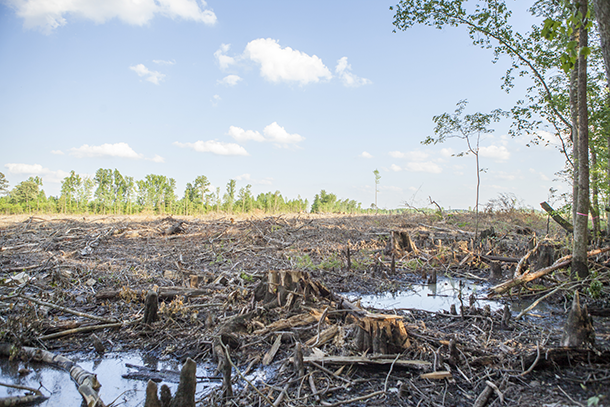Our Forests Aren’t Fuel
October 26, 2015
Forests are appreciated for many different reasons, but I have come to find that not everyone realizes just how important they are. Forests are one of the best tools we have for fighting climate change, which is extremely important in this day and age due to the growing issue of global warming. Each tree has the ability to sequester carbon which would be harmful to earth’s climate if released into the atmosphere. For this reason many sections of woodlands have been protected for years in order to prevent any damage from being done to them. However, this is not the case for all forests; those that are not as protected as others have become the target of a growing industry that could be causing more harm to our climate than good.
Recently, a forest conservation group from Asheville, N.C., by the name of Dogwood Alliance, came and spoke to a few members of the PC and Laurens County communities, to inform us on some big issues that have been growing over recent years. Most people are aware that for the past several years the world has been striving to “Go Green”, which involves making wiser decisions about the amounts and types of waste we emit into the world, particularly into the atmosphere. Our goal is to reduce greenhouse gas emissions and thus reduce the effects of global warming, but new companies whose concerns are more economical than environmental are making it difficult for us to keep our world as “Green” as we would like to.
Emily Zucchino from Dogwood Alliance spoke to us about how the biomass industry has recently risen in popularity because it claims to be a company that is focused on producing low-carbon energy solutions. This industry uses trees (woody biomass) as an energy source to replace fossil fuels. The trees are chipped or turned into wood pellets and burned for fuel just the same as coal.
Zucchino told us that it is the belief of this industry that the burning of wood pellets is a “greener” solution because of their claim that cutting down one tree and planting another in its place would allow for the amount of carbon emission to cancel out. Recent studies, however, have shined a new light on this belief, saying that the burning of wood pellets actually produces more carbon than the burning of fossil fuels and therefore “the current wood energy targets seem excessive and harmful to the climate” (Kallio, Salminen, and Sievänen, 2013).
Enviva is a company employed by the biomass industry that collects the majority of the trees it uses to create wood pellets from the Southern United States. This company usually performs clear cuts in which entire sections of forests are chopped down in order to acquire the amount of timber needed to create enough wood pellets to be shipped off to their main customer located in the UK. I was astonished to find out that foreign companies were profiting from the destruction of our beautiful southern forests and that they were only doing further harm to our climate in the process.
I was even more astonished when Zucchino told us that Enviva is looking to build another one of their facilities in Laurens County.
As a PC student and someone who has spent the majority of their time in Laurens County over the past two years and has seen the abundance of forest land in the area, I am completely against the idea of this company building in this area and destroying the local forests. With this article, it is my goal to educate the PC community on this important issue and to provide the background information needed in order to understand that this is not the kind of company that should be welcomed into a community that values its natural forests.
I hope that I have at least made you aware of this growing issue, and I hope that you will pass this information on so that others may also be informed on something that should not be taken lightly. Our southern forests may stand strong but we must stand stronger for them, in order to prevent this damage from being done to this community and our climate.
I would like to thank Emily Zucchino for coming to PC on behalf of Dogwood Alliance to speak with us on this issue. I would also like to invite anyone who would like further information on Dogwood Alliances’ “Our Forests Aren’t Fuel” campaign to visit www.dogwoodalliance.org for more information.
***
Kallio, A., Salminen, O., & Sievänen, R. (2013). Sequester or substitute—Consequences of increased production of wood based energy on the carbon balance in Finland. Journal of Forest Economics, 19(4), 402-415.






